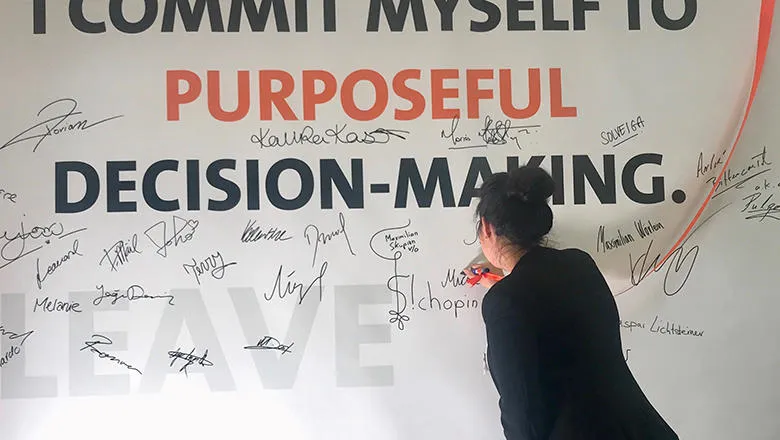17 May 2019
What is the purpose of capital?
Two King's Business School students were invited to the St Gallen Symposium to explore the question

PhD student Micaela Mihov and MSc student Claudio Marseglia recently joined 200 student ‘Leaders of Tomorrow’ from around the world at the 49th St. Gallen Symposium. They attended as guests of the Symposium after being selected to share their ideas with CEOs, thought leaders and policy makers based on their essays on this year’s theme.
Micaela explains what prompted her to take part, and why it proved an inspirational experience
When I read this year’s theme for the St. Gallen Symposium ‘Capital for purpose’, I was excited. This year’s symposium was devoted to developing approaches that will help combat short-term and exclusively profit-centric thinking in businesses of all sizes and in the public sector.
With speakers as diverse as Heng Swee Keat, Singapore’s Deputy Prime Minister and Minister for Finance; Audrey Choi, the Morgan Stanley Chief Marketing & Sustainability Officer who served as policy adviser to Al Gore during his Vice Presidency; Christian Mumenthaler, Group Chief Executive Swiss Re; and historian Niall Ferguson of Harvard University all presenting their own strongly-argued perspectives, the ground was set for some stimulating and challenging debate.
My own PhD research, investigating the socio-economic role of public-private partnerships (PPPs) in providing public infrastructure, directly addresses the theme of capital for purpose. How can the capital we invest in infrastructure generate positive and sustainable social and environmental impact?
One of the Symposium’s speakers, Colin Mayer, Professor of Management Studies at Oxford University, gave an inspirational talk on this issue. In his view, public and private sector interests must be aligned within PPPs by ‘making it a fiduciary responsibility of directors to not just uphold their shareholder interest, but to promote the public functions that they are performing’.
Fundamental changes like his proposal are certainly needed. Through my research, I have observed how private companies in PPP projects can sometimes exploit their contracts with the public sector to increase immediate profits, while harming the wider public good.
I believe that policy-makers should demand more of PPPs. As part of my advisory work for the German public sector with Partnerschaft Deutschland, I attended a UN meeting last year on the role of PPPs in advancing the UN Sustainable Development Goals. I was surprised by the limited output of national policy-makers on the topic. Their expectations of the potential positive impact of infrastructure investments seemed to be limited simply to providing infrastructure on time and on budget, with concerns about environmental and social sustainability playing no role.
This can hardly be the only purpose of these partnerships. In my view, private companies involved in PPPs should be expected not only to provide the specific public service for which they are paid, but also to think about the wider impact of their work on the environment or the local community.

Having the opportunity to discuss these ideas with Dominic Barton, Global Managing Partner Emeritus of McKinsey & Company at a private talk with a few other delegates was a personal highlight of the Symposium. He was very approachable and truly interested in hearing about our ideas. He encouraged me to be ambitious about the practical implications of my PhD research, and how we can use Public Private Partnerships as tools of innovation in the financial, political, social and environmental spheres.
Beyond all the speeches, group sessions and private talks, what amazed me most at St Gallen were the highly driven students from all sorts of academic, professional and cultural backgrounds.
I met young people that should be a genuine source of inspiration to both our generation and to current leaders. They dedicate their time to youth empowerment in South Korea, water resource management in the United States, early childhood intervention in India or science education in Jamaica – to name just a few of the many initiatives.
Apply to the St. Gallen Symposium and join the community of Leaders of Tomorrow. I promise this experience will educate, reward and challenge you.
Micaela Mihov is a PhD Student at King’s Business School.
